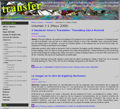A Gendered Voice in Translation: Translating Like a Feminist
Article Sidebar

Main Article Content
Eva , 1966- Espasa Borràs
This article addresses the paradoxes and challenges of the gendered voice in translation. The experience of translating feminist −as well as not-feminist− texts may lead us to rethink women’s identity, in terms of the essentialist versus constructionist debates: from the strategic need to be a feminist, −to accept one’s feminist identity− to the realisation that one can never become really one, assuming one’s identity as performative and contingent.
Addressing a gendered reader implies an interpretive choice in translation. Envisaging a specific readership is challenging, especially in Romance languages where the subject is always gendered, both socially and grammatically. Gendered translations go far beyond using specific textual strategies for avoiding sexism. Rather, they lead to a constant rethinking of agency, of who does what both in and out of the text. Ultimately, this may involve translating like an invisible agent.
This article is illustrated with specific translation options from the author’s rendering into Catalan of Diana Fuss’ (no es necesaria) Essentially Speaking (Vic: Eumo, 1999), with the aim of rethinking writing practices, and identities, ‘like’ feminists.
Addressing a gendered reader implies an interpretive choice in translation. Envisaging a specific readership is challenging, especially in Romance languages where the subject is always gendered, both socially and grammatically. Gendered translations go far beyond using specific textual strategies for avoiding sexism. Rather, they lead to a constant rethinking of agency, of who does what both in and out of the text. Ultimately, this may involve translating like an invisible agent.
This article is illustrated with specific translation options from the author’s rendering into Catalan of Diana Fuss’ (no es necesaria) Essentially Speaking (Vic: Eumo, 1999), with the aim of rethinking writing practices, and identities, ‘like’ feminists.
Article Details
Cómo citar
Espasa Borràs, Eva , 1966-. «A Gendered Voice in Translation: Translating Like a Feminist». Transfer: revista electrónica sobre traducción e interculturalidad, vol.VOL 3, n.º 1, pp. 1-8, https://raco.cat/index.php/Transfer/article/view/203816.
Derechos
Derechos de autor
Transfer. Revista electrónica sobre Traducción e Interculturalidad/e-Journal on Translation and Intercultural Studies by CRET is licensed under a Creative Commons Reconocimiento-NoComercial-SinObraDerivada 3.0 Unported License.
Creado a partir de la obra en www.ub.edu/lettere/transfer
Permissions beyond the scope of this license may be available at www.ub.edu.